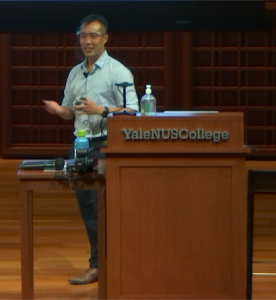Resilience is defined as the capacity to recover from difficulty and to bounce back.
Resilience and Success in College (RSC) is a 1 unit elective course led by the Student Affairs Office (SAO). The course aims to:
- Expose students to basic concepts of positive psychology
- Engage students in self-reflection and discussion of relevant topics that contribute to well-being
- Equip students with the knowledge and skills to start and sustain conversations with their peers about holistic well-being
- Support students on their journey towards a thriving college experience

Structure of the Course
Each training session features a one-hour lecture by experts in the field on concepts and ideas relating to mental resilience and practices that can be incorporated into daily life. Subsequently, students will meet weekly in small discussion groups with a facilitator from the SAO to share about how they have utilised the skills they have learnt in their day-to-day activities and interactions.
Course Overview
- Culture of Care
- A foundation for a culture of care towards self and others
- Being an active listener
- Being an effective responder
- Envisioning a campus-wide culture of care
- Purposefulness
- Identify your own purpose in college and beyond
- Closing the purpose gap between passion and career
- Using your Strengths
- Identify your core strengths
- Applying the core strengths in doing and reflecting
- Vulnerability
- Debunk myths of vulnerability
- Build healthy boundaries and trust with others
- Positive Interpersonal Relationships
- Understanding others’ influence on you
- Responding appropriately to self and others
- Cultivating Optimism
- Build optimism
- Understanding the difference between healthy and toxic optimism




